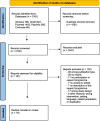The impact of emotional support on healthcare workers and students coping with COVID-19, and other SARS-CoV pandemics - a mixed-methods systematic review
- PMID: 37443003
- PMCID: PMC10339499
- DOI: 10.1186/s12913-023-09744-6
The impact of emotional support on healthcare workers and students coping with COVID-19, and other SARS-CoV pandemics - a mixed-methods systematic review
Abstract
Background: Pandemics such as COVID-19 pose threats to the physical safety of healthcare workers and students. They can have traumatic experiences affecting their personal and professional life. Increasing rates of burnout, substance abuse, depression, and suicide among healthcare workers have already been identified, thus making mental health and psychological wellbeing of the healthcare workers a major issue. The aim of this systematic review is to synthesize the characteristics of emotional support programs and interventions targeted to healthcare workers and students since the onset of COVID-19 and other SARS-CoV pandemics and to describe the effectiveness and experiences of these programs.
Method: This was a mixed method systematic review. The Preferred Reporting Items for Systematic Reviews and Meta-Analyses (PRISMA) guidelines were followed, and the review was registered on PROSPERO [CRD42021262837]. Searches were conducted using Medline, CINAHL, PsycINFO, Cochrane Library, and Scopus databases. The COVIDENCE systematic review management system was used for data selection and extraction by two independent reviewers. The JBI (Joanna Briggs Institute) critical appraisal tools were used to assess the quality of selected studies by two additional reviewers. Finally, data extraction and narrative analysis were conducted.
Results: The search retrieved 3161 results including 1061 duplicates. After screening, a total of 19 articles were included in this review. Participants in studies were nurses, physicians, other hospital staff, and undergraduate medical students mostly working on the front-line with COVID-19 patients. Publications included RCTs (n = 4), quasi-experimental studies (n = 2), cross-sectional studies (n = 6), qualitative interview studies (n = 3), and systematic reviews (n = 4). Most (63.4%) of the interventions used online or digital solutions. Interventions mostly showed good effectiveness (support-seeking, positive emotions, reduction of distress symptoms etc.) and acceptance and were experienced as helpful, but there were some conflicting results.
Conclusion: Healthcare organizations have developed support strategies focusing on providing emotional support for these healthcare workers and students, but it is difficult to conclude whether one program offers distinct benefit compared to the others. More research is needed to evaluate the comparative effectiveness of emotional support interventions for health workers.
Keywords: COVID-19; Emotional; Healthcare; Resilience; SARS; Second victim; Support; Systematic review.
© 2023. The Author(s).
Conflict of interest statement
The authors declare no competing interests.
Figures
Similar articles
-
Beyond the black stump: rapid reviews of health research issues affecting regional, rural and remote Australia.Med J Aust. 2020 Dec;213 Suppl 11:S3-S32.e1. doi: 10.5694/mja2.50881. Med J Aust. 2020. PMID: 33314144
-
Nurses' coping strategies caring for patients during severe viral pandemics: A mixed-methods systematic review.J Clin Nurs. 2024 Jan;33(1):242-254. doi: 10.1111/jocn.16711. Epub 2023 Apr 10. J Clin Nurs. 2024. PMID: 37032642
-
Promoting and supporting self-management for adults living in the community with physical chronic illness: A systematic review of the effectiveness and meaningfulness of the patient-practitioner encounter.JBI Libr Syst Rev. 2009;7(13):492-582. doi: 10.11124/01938924-200907130-00001. JBI Libr Syst Rev. 2009. PMID: 27819974
-
What We Have Learned from Two Decades of Epidemics and Pandemics: A Systematic Review and Meta-Analysis of the Psychological Burden of Frontline Healthcare Workers.Psychother Psychosom. 2021;90(3):178-190. doi: 10.1159/000513733. Epub 2021 Feb 1. Psychother Psychosom. 2021. PMID: 33524983 Free PMC article.
-
Organizational interventions to support and promote the mental health of healthcare workers during pandemics and epidemics: a systematic review.BMC Health Serv Res. 2025 May 21;25(1):731. doi: 10.1186/s12913-025-12888-2. BMC Health Serv Res. 2025. PMID: 40394626 Free PMC article.
Cited by
-
Supports for Mental Well-Being Valued by Healthcare Workers: Qualitative Analysis of Data From a Canadian Cohort of Healthcare Workers During the COVID-19 Pandemic.New Solut. 2025 Aug;35(2):162-172. doi: 10.1177/10482911251322502. Epub 2025 Mar 4. New Solut. 2025. PMID: 40033906 Free PMC article.
-
On the path to recovery: traumatic stress research during the COVID-19 pandemic 2021-2023.Eur J Psychotraumatol. 2023;14(2):2281988. doi: 10.1080/20008066.2023.2281988. Epub 2023 Dec 1. Eur J Psychotraumatol. 2023. PMID: 38038964 Free PMC article.
-
Rural healthcare workers' well-being: A systematic review of support interventions.Fam Syst Health. 2024 Sep;42(3):355-374. doi: 10.1037/fsh0000921. Fam Syst Health. 2024. PMID: 39418422
-
Alexithymia, Burnout, and Hopelessness in a Large Sample of Healthcare Workers during the Third Wave of COVID-19 in Italy.Brain Sci. 2023 Nov 5;13(11):1550. doi: 10.3390/brainsci13111550. Brain Sci. 2023. PMID: 38002510 Free PMC article.
-
Stigmatization experiences of healthcare workers in the context of the COVID-19 pandemic: a scoping review.BMC Health Serv Res. 2024 Jul 17;24(1):823. doi: 10.1186/s12913-024-11300-9. BMC Health Serv Res. 2024. PMID: 39020333 Free PMC article.
References
-
- Busch IM, Moretti F, Mazzi M, Wu AW, Rimondini M. What we have learned from two decades of epidemics and pandemics: a systematic review and meta-analysis of the psychological burden of frontline healthcare workers. Psychother Psychosom. 2021;90(3):178–190. doi: 10.1159/000513733. - DOI - PMC - PubMed
-
- Carrieri D, Briscoe S, Jackson M, Mattick K, Papoutsi C, Pearson M, et al. ‘Care Under Pressure’: a realist review of interventions to tackle doctors’ mental ill-health and its impacts on the clinical workforce and patient care. BMJ Open. 2018;8(2):e021273. doi: 10.1136/bmjopen-2017-021273. - DOI - PMC - PubMed
-
- Rossi R, Socci V, Pacitti F, Di Lorenzo G, Di Marco A, Siracusano A, et al. Mental health outcomes among frontline and second-line health care workers during the coronavirus disease 2019 (COVID-19) pandemic in Italy. JAMA Netw Open. 2020;3(5):e2010185. doi: 10.1001/jamanetworkopen.2020.10185. - DOI - PMC - PubMed
Publication types
MeSH terms
LinkOut - more resources
Full Text Sources
Medical
Miscellaneous


